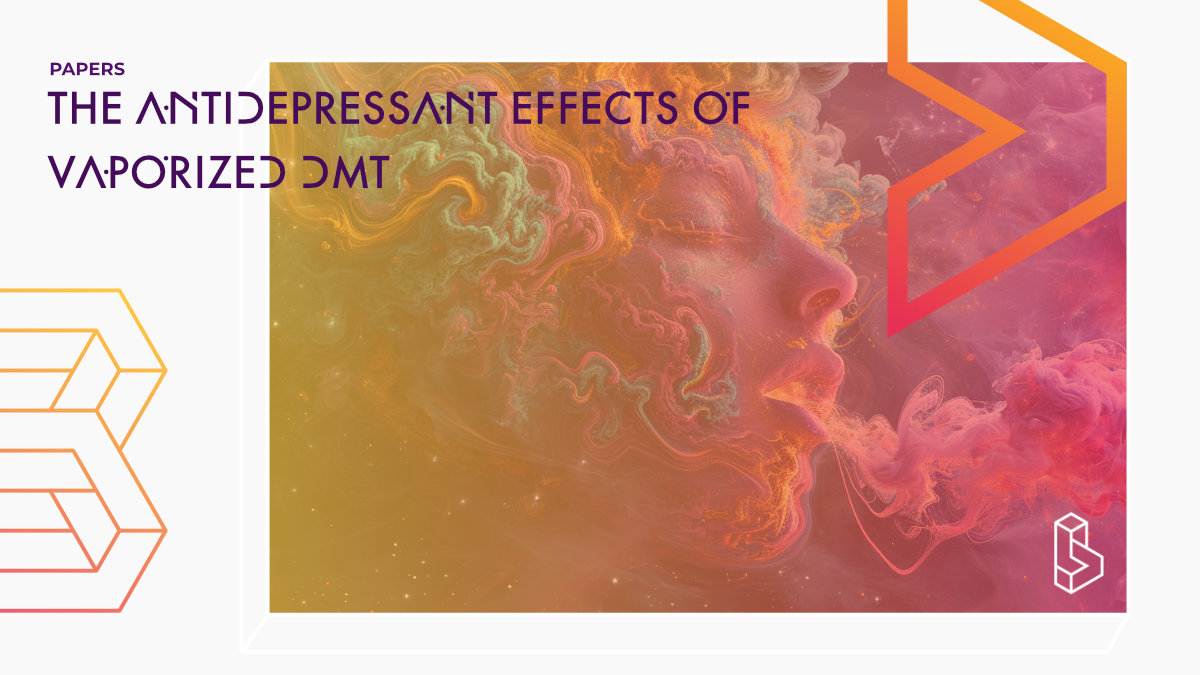This open-label Phase IIa clinical trial, pre-print (n=6), examines the efficacy of vaporized DMT in treating treatment-resistant depression (TRD). Patients experienced significant reductions in two depression scores (MADRS & PHQ-9), with 83% responding to treatment by day 7 and 66.67% achieving remission. The rapid onset and sustained antidepressant effects of vaporized DMT suggest its potential as a practical and accessible option in psychedelic treatments for depression within interventional psychiatry.
Abstract of The antidepressant effects of vaporized DMT
“Introduction N,N-Dimethyltryptamine (DMT), a naturally occurring psychedelic tryptamine contained in the indigenous ayahuasca brew has shown antidepressant effects. This Phase 2a clinical trial investigates for the first time the efficacy of isolated DMT in treatment-resistant depression (TRD).
Methods Six TRD patients participated in an open-label, fixed-order, dose-escalation study, receiving a lower (15 mg) and then a higher (60 mg) dose of vaporized DMT in a single-day session. Depression severity was assessed using the Montgomery-Asberg Depression Rating Scale (MADRS) and the Patient Health Questionnaire-9 (PHQ-9) up to one-month post-dosing.
Results Significant reductions in MADRS and PHQ-9 scores were noted from Day 1 to M1. The mean MADRS score variation from baseline to D7 was −22 points and −17 points at M1. PHQ-9 scores also showed significant decreases, mirroring the MADRS results. By D7, 83.33% of patients responded to treatment, with 66.67% achieving remission. At M1, 66.67% maintained response, and 50% maintained remission.
Discussion The rapid onset and sustained antidepressant effects of vaporized DMT align with the paradigm of rapid-acting antidepressants to be used in the scope of interventional psychiatry. The non-invasive route and short-acting nature of DMT offer practical advantages, potentially enhancing accessibility to psychedelic treatments.”
Authors: Marcelo Falchi-Carvalho, Handersson Barros, Raynara Bolcont, Sophie Laborde, Isabel Wießner, Sérgio Ruschi B. Silva, Daniel Montanini, David C. Barbosa, Ewerton Teixeira, Rodrigo Florence-Vilela, Raissa Almeida, Rosana K. A. de Macedo, Flávia Arichelle, Érica J. Pantrigo, Emerson Arcoverde, Nicole Galvão-Coelho, Draulio B. Araujo & Fernanda Palhano-Fontes
Summary of The antidepressant effects of vaporized N,N-Dimethyltryptamine: a preliminary report in treatment-resistant depression
Introduction
N,N-Dimethyltryptamine (DMT) is a naturally occurring psychedelic tryptamine that induces profound changes in consciousness. South American Indigenous populations have long harnessed the psychoactive properties of DMT through Ayahuasca, a brew that incorporates monoamine oxidase inhibitors to prevent DMT’s rapid deamination by MAO, thus enabling its psychotropic effects. Recent clinical evidence has suggested the therapeutic effects of Ayahuasca, particularly in the context of mood disorders.
Methods
Find this paper
https://doi.org/10.1101/2024.01.03.23300610
Open Access | Google Scholar | Backup | 🕊
Cite this paper (APA)
Falchi-Carvalho, M., Barros, H., Bolcont, R., Laborde, S., Wiessner, I., Silva, S. R., ... & Palhano-Fontes, F. (2024). The antidepressant effects of vaporized N, N-Dimethyltryptamine: a preliminary report in treatment-resistant depression. medRxiv, 2024-01.
Study details
Compounds studied
DMT
Topics studied
Treatment-Resistant Depression
Depression
Study characteristics
Original
Open-Label
Participants
6
Humans
Compound Details
The psychedelics given at which dose and how many times
DMT 15 - 60mg | 2x
Linked Research Papers
Notable research papers that build on or are influenced by this paper
Rapid and sustained antidepressant effects of vaporized N,N-dimethyltryptamine: a phase 2a clinical trial in treatment-resistant depressionThis open-label fixed-order dose-escalation trial (n=14) evaluated inhaled DMT (15mg & 60mg) for treatment-resistant depression (TRD) for the first time. Results showed rapid and sustained antidepressant effects with a 21-point reduction on the Montgomery-Asberg Depression Rating Scale by day 7 (p<0.001), an 86% response rate, and a 57% remission rate lasting up to 3 months, with significant decreases in suicidal ideation (SI).
Safety and tolerability of inhaled N,N-Dimethyltryptamine (BMND01 candidate): A phase I clinical trial
This open-label, single-ascending, fixed-order dose-response study (n=27) investigates the safety and tolerability of inhaled DMT. The healthy volunteers received varying doses of inhaled DMT (5-60mg). Preliminary findings indicate dose-dependent increases in intensity, valence, and perceptual ratings, with no significant safety concerns, suggesting inhaled DMT as a potentially efficient and safe administration method.

